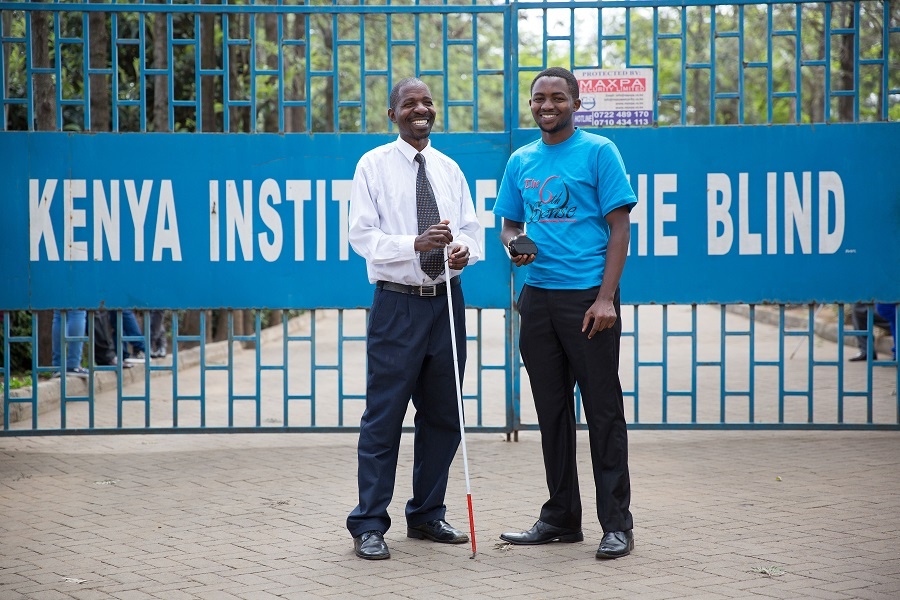Growing up, Brian Mwenda attended integrated schools, where he interacted and became friends with many visually-impaired people. Later, he started using his technical skills to improve their quality of life.
At university, while studying for an engineering degree in electronics, he began prototyping assistive devices that could help his friends integrate better into society. One of these devices was shortlisted for the Africa Prize for Engineering Innovation in 2017, and it was that same year that Mwenda turned his vision into a company – Hope Tech +.
Hope Tech + is a medical technology company that creates assistive devices for visually impaired people to enable them to experience true freedom of movement, and thus facilitates increased participation in society and access to education, entrepreneurship, employment and social activities.
“We are working to create a world with zero barriers to participation for over 285 million visually impaired globally,” Mwenda told Disrupt Africa.
The founding idea was to create a device that could completely free visually impaired people from using white canes to walk.
“A device that could detect all obstacles in the user’s path, give feedback to the user in a way that they can easily understand the different messages, a reliable device that the user would feel safe to walk with. All this is with the goal of replacing the need for a human guide or guide dog whenever a visually impaired person wanted to move around,” said Mwenda.
This device was prototyped while the company was bootstrapping, and launched under the name of the Fourth Eye in 2019 in partnership with an engineering company from India. A low-cost high utility device that can convert any cane into a smart cane, the Fourth Eye uses echo-location technology to image obstacles and alerts the user using haptic feedback.
“Using vibrations users are able to “feel” their environment and navigate with ease. Having to ask for assistance whenever one wants to move around diminishes the human dignity of visually impaired people, but with the Fourth Eye devices, they are free to move around with ease and confidence,” said Mwenda.
Hope Tech + has already built a user base of over 1,200 across Kenya, and is in the process of setting up to scale continent-wide. “We already have trial users in Ethiopia, Tanzania, Uganda, Rwanda, Nigeria and South Africa,” Mwenda said.
This is only the beginning from a product perspective, however. While rolling out the Fourth Eye, Mwenda and his team have also been building The Sixth Sense, another mobility assistance device that guides users safely through their environment by detecting physical hazards and relaying that information.
A wearable device that can be configured to suit the user’s needs, The Sixth Sense consists of a wearable sensor module, an adjustable feedback chest strap with vibrating haptic motors, and wrist strap wearables for navigation and greater resolution of obstacle detection.
Mwenda said launching The Fourth Eye while overseeing the product development of The Sixth Sense had been a very important strategy.
“We got to interact better with our target users through actually selling them a similar product, and started building our database early enough. We also built a revenue base which allowed us to delay a funding round until close to the launch of The Sixth Sense, and got to interact more with stakeholders who have continued to support us in so many ways, especially through subsidising the cost of the Fourth Eye device and even buying for donations,” he said.
Meanwhile, product development for The Sixth Sense has been fast-tracked, and Hope Tech + is working with engineers from Australia and the United Kingdom (UK) to bring to the market a product of the highest standards that meets international regulatory requirements.
“We are setting up to launch The Sixth Sense across Europe, Australia and in Africa, and we are continuing to do extensive trials in these regions and meeting all necessary compliance requirements,” Mwenda said.
“We are targeting to launch the last quarter of 2021 after clinical trials. That is of course with our fingers crossed that this pandemic cools down soon.”
When the startup does get its second product into the market, Mwenda believes it will prove revolutionary for the visually impaired.
“The Sixth Sense uses computer vision technology that has only just become available for this kind of application recently, and we believe the timing is right,” he said.
“Based on feedback from users across the world, it will greatly improve the lives of visually impaired people economically and socially. We believe everyone has a right to live a full life, not limited by physical or societal barriers that technology can solve.”


